
Obviously, I love the Sid Meier's Civilization game franchise. I've been playing it since Civ III, and even own the Fantasy Flight board game (which I also really like). This game series has kept me up, one-more-turning, into the wee hours of the morning on many occasions. Despite my love for the games, this series can also really grind my gears sometimes.
One of my persistent frustrations with the Civilization series of games is the way that it handles difficulty levels. Granted, this seems to be a common issue in all strategy games, so Civ is certainly not unique in this frustration. Basically, the higher difficulties don't make the A.I.s play better; rather, it just gives them free stuff at the beginning of the game, and buffs their production, research, and so on. The free stuff includes (depending on the difficulty level selected): extra settlers, extra military units, free workers/builders, free technologies, extra gold, extra population in its starting city, and so forth.
There's three key problems with this design paradigm:
- It front-loads the challenge in a game that is supposed to have very long play-sessions
- It limits player options
- It rushes the pace of the game
The front-loading of frustration
Giving the A.I.s extra stuff at the beginning of the game only makes the game harder by giving the A.I.s a handicap - a head start. It doesn't make the A.I.s better - or the game harder - in the long run. The A.I.s still chose crappy locations for those extra settlers to plant their cities - often putting them in un-productive locations, or (in the case of Civ VI) putting them so close together that they can't fit enough districts in. The A.I. doesn't plan ahead regarding where its districts will be, and it often places those districts in sub-optimal locations. "Sub-optimal" being an understatement.
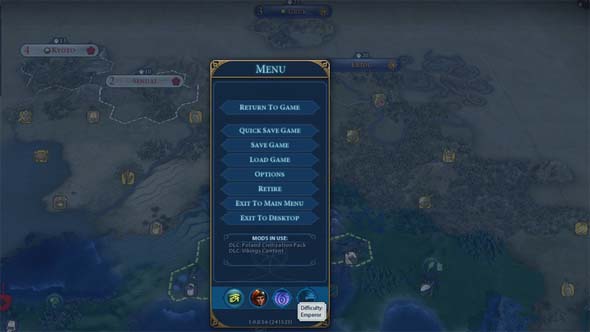
The A.I. starting with extra settlers on high difficulties doesn't make the game harder in the long run.
Those free extra units aren't used more effectively either. Even with a few extra warriors, the A.I. still can't plan or execute a city siege, as it's generally inept at handling the one-unit-per-tile, hex-based combat, and they rarely bother to escort their civilian units. The developers can't be completely blamed for this, as A.I. for tactical combat is a very difficult problem to solve. Most games that have A.I.-driven tactical combat either don't have any grand strategy at all (as in Panzer General), or the grand strategy is separated into a completely different layer of gameplay (as in Total War).
Once the human player can get his or her cities up and running, get a sizable military built, and start conquering the A.I., all these free starting units become moot. These extra units can even backfire. A.I. cities can usually easily be captured by the human player. Since the A.I. gets buffs towards population growth, production, and other yields, those cities tend to grow faster than the player's cities anyway. So if they're conquered, then the human player gets better cities than they could have founded on their own, and gets them sooner than if they had spent the time to build their own settlers.
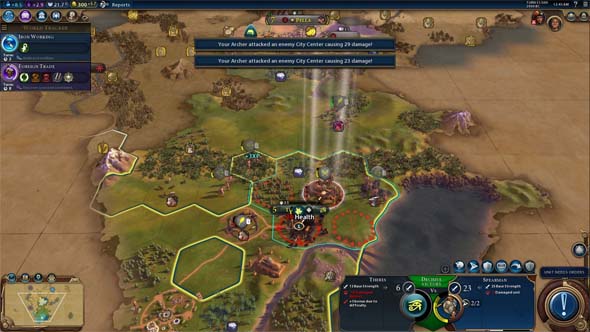
It's not hard to capture A.I. cities, which are often larger and more developed
than any city the player could have founded within the same amount of time.
These early hurdles aren't that difficult to overcome, and once the A.I.'s starting advantages have been neutralized, they don't pose much of an increased threat long-term. Usually, if an A.I. is threatening me late in the game, it's only because they were isolated on another continent and were able to steamroll all the competition there, thus creating a single, massive continental military and economy.
False options
One thing that higher difficulties achieve is to make the game an annoying slog at the start, and to reduce the number of viable options and strategies for the player. The bonuses that the A.I.s get makes it impractical for the human player to compete for early-game wonders, or for founding the first religions, or for getting early great people. So civs with early-game abilities can feel like those powers go squandered.
China's Quin Shi Haung is a prime example of a leader who is completely undercut by the A.I. handicapping. Quin Shi has the ability to spend builder charges to rush ancient and classical wonder production. But even with this ability, it's prohibitively difficult for the human player to compete for some early wonders such as Stonehenge, Hanging Gardens, the Oracle, Terra Cotta Army, and Chichen Itza. Sure, a human-controlled China can probably compete for the Pyramids, the Colossus, and the Great Lighthouse, but that's only because the A.I. doesn't seem to prioritize these wonders, they don't get built till mid or late-game, and so it's still pointless to use builder charges to rush them. Getting these early wonders isn't impossible for the human player, but the fact that the A.I.s have an overwhelming advantage makes any investment in early wonders a complete crap-shoot that probably isn't worth it.
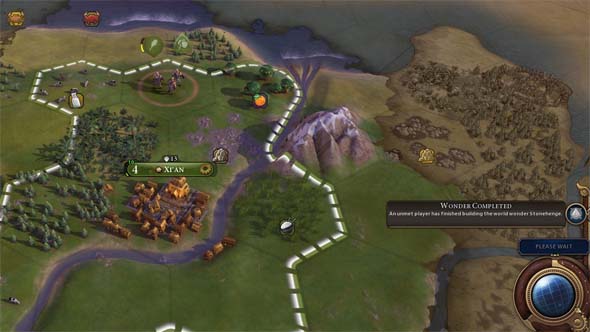
Early wonders become prohibitively difficult to complete -- even for leaders with wonder-building bonuses.
Further, the increased aggression of the A.I. civs, as well as the increased frequency and threat from barbarians can severely limit the player's early-game options. The combination of A.I. army swarms (in the form of "Stacks of Doom" or "Carpets of Doom"), constantly-respawning barbarians, and the general inability to compete with A.I.'s economic, technological, and cultural handicaps often shoe-horns the player into investing in military at the expense of other areas of development. So even though there are many options available to the player (in terms of social policies, what to build, what to research, etc.), a lot of those choices feel like false choices.
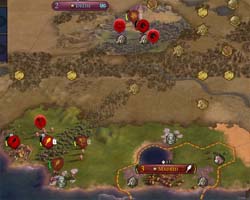
Barbarians spawn very close to cities with
early access to relatively advanced units.
Building many units early becomes a practical necessity, and it's hard to justify adopting any policy other than Discipline (or not pursuing the Military Tradition civic for the flanking bonuses) when there's barbarian outposts routinely spawning within 4 tiles of your cities and unleashing hordes of spearmen, horsemen, and horse archers. Each unit trained has an opportunity cost of not having been able to build an economic, scientific, or cultural building. These sorts of issues very heavily push the player in the direction of military aggression, and severely limit the potential for building up a peaceful nation based around trade and cultural advancement. It also becomes much more critical to bee-line to essential techs and civics, leaving the player with little freedom to pursue alternative play-styles, and it makes many games feel very rote.
Again, I want to re-emphasize that all this extra challenge is front-loaded. In a game that's supposed to last for hundreds of turns and which is often played over the course of days or weeks, this can really cause the mid and late-game to drag. You've either already fallen into an insurmountable hole, in which case you probably just abandon the game and start again, or you've overcome the early obstacles, and the rest of the game is just a foregone conclusion and an exercise in hitting "Next Turn" until you hit a victory screen.
Heck, sometimes I feel pressured to go for an all-out military victory simply because it will end the game sooner, and I won't have to put up with the end-game drag.
Era rush
The last major issue with Civ's highest difficulties (from my perspective) is how it dramatically increases the pace of the game. A.I.s on Emperor, Immortal, and Diety difficulties routinely progress to late-game eras very quickly. I've seen A.I.s reach the renaissance around 600 B.C., and I've seen them hit the modern era by 400 A.D.. To put this into perspective, an A.I. on a high difficulty in Civ will be teching to Universities before the real-life Plato was writing his Socratic dialogues, and the A.I.s will be developing the internal combustion engine and airplane around the time that the real-life Western Roman Empire was falling.
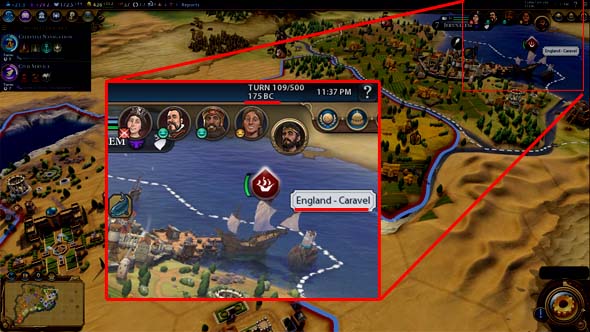
A.I.s will blaze through the tech and civics trees, and I've seen A.I.s in the Renaissance as early as 800 B.C.
I don't know about you, but this rapid game pacing just isn't fun for me.
This isn't just a superficial or personal annoyance; it actually has gameplay implications. The most obvious of which is that civilizations with early-game uniques have a very short window in which to use those uniques. Egyptian War Chariots are very nice units, but good luck getting any produced early enough for them to actually be useful. For me, the medieval era usually flashes by in the blink of an eye, which makes a lot of medieval units (not to mention religious play) feel like they have an even more narrow window of opportunity.
Assuming that the A.I.s in the game are bound by the same rules regarding production cost scaling as the human player, then this rapid technological progression of the A.I.s can also potentially be detrimental to their play! For the human player, the cost of city infrastructure (particularly districts) is currently scaled based on your cumulative progress through the tech and civic trees. Assuming that the A.I. is also bound by this rule, then their technology handicap could actually drag down their ability to produce districts.
The same is true for military unit production. Later-era units are more expensive than early-era units. So if an A.I. is teching to Gunpowder or Military Tactics or Cartography, then they are losing access to "obsolete" early-game units such as Swordsmen, Spearmen, and Galleys, and may not have the production to efficiently construct the more advanced replacements, nor may they posses the money to upgrade those units.
So when an A.I. civilization is advancing to the renaissance in 600 B.C., that civ may be crippling its own ability to produce anything. Those production buffs that the A.I. receives from the higher difficulty aren't making the A.I. more productive (or at least not as productive as they should be); the production buffs are just offsetting the artificially-upscaled cost of all the A.I.'s units and infrastructure as the game progresses.
How can we solve these perceived problems?
While I can play on Immortal and Diety level, I always prefer not to because of the complaints outlined above. If I wanted to play a military tactics game, then I'd play an actual military tactics game -- preferably one with good A.I.. I play Civilization because I like building an empire and seeing little alternate histories play out on my computer screen. I don't feel like I get to do that on the highest difficulty settings.
Whenever possible, I try supplement my complaints with some constructive criticism as well. So in my next post, I'm going to talk about some of my own ideas for how Firaxis could possibly resolve the problems that I outlined above.